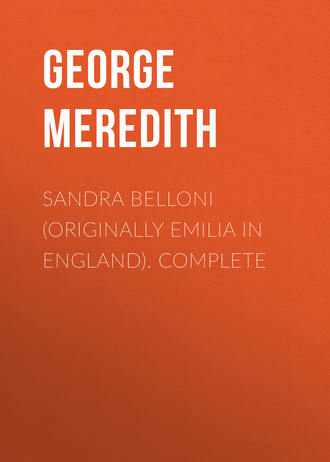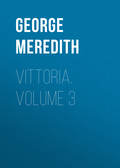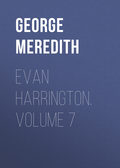
George Meredith
Sandra Belloni (originally Emilia in England). Complete
Emilia may have had some warning sense that admiration is only one ingredient of homage, that to make it fast and true affection must be won. Now, poor people, yokels, clods, cannot love what is incomprehensible to them. An idol must have their attributes: a king must show his face now and then: a song must appeal to their intelligence, to subdue them quite. This, as we know, is not the case in the higher circles. Emilia may have divined it: possibly from the very great respect with which her finale was greeted. Vigorous as the “Brayvos” were, they sounded abashed: they lacked abandonment. In fact, it was gratitude that applauded, and not enthusiasm. “Hillford don’t hear stuff like that, do ‘em?” which was the main verbal encomium passed, may be taken testificatorily as to this point.
“Dame! dame!” cried Emilia, finding her way quickly to one of the more decently-bonneted women; “am I not glad to see you here! Did I please you? And you, dear Farmer Wilson? I caught sight of you just as I was finishing. I remember the song you like, and I want to sing it. I know the tune, but the words! the words! what are the words? Humming won’t do.”
“Ah, now!” quoth Farmer Wilson, pointing out the end of his pipe, “that’s what they’ll swallow down; that’s the song to make ‘em kick. Sing that, miss. Furrin songs ‘s all right enough; but ‘Ale it is my tipple, and England is my nation!’ Let’s have something plain and flat on the surface, miss.”
Dame Wilson jogged her husband’s arm, to make him remember that talking was his dangerous pastime, and sent abroad a petition for a song-book; and after a space a very doggy-eared book, resembling a poodle of that genus, was handed to her. Then uprose a shout for this song and that; but Emilia fixed upon the one she had in view, and walked back to her harp, with her head bent, perusing it attentively all the way. There, she gave the book to Captain Gambier, and begged him to hold it open before her, with a passing light of eyes likely to be rather disturbing to a jealous spectator. The Captain seized the book without wincing, and displayed a remarkable equanimity of countenance as he held it out, according to direction. No sooner had Emilia struck a prelude of the well-known air, than the interior of the booth was transfigured; legs began to move, elbows jerked upward, fingers fillipped: the whole body of them were ready to duck and bow, dance, and do her bidding she had fairly caught their hearts. For, besides the pleasure they had in their own familiar tune, it was wonderful to them that Emilia should know what they knew. This was the marvel, this the inspiration. She smiled to see how true she had struck, and seemed to swim on the pleasure she excited. Once, as her voice dropped, she looked up at Captain Gambier, so very archly, with the curving line of her bare throat, that Wilfrid was dragged down from his cynical observatory, and made to feel as a common man among them all.
At the “thrum-thrum” on the harp-strings, which wound up the song, frenzied shouts were raised for a repetition. Emilia was perfectly willing to gratify them; Captain Gambier appeared to be remonstrating with her, but she put up her joined hands, mock-petitioningly, and he with great affability held out the book anew. Wilfrid was thinking of moving to her to take her forcibly away when she recommenced.
At the same instant—but who, knowing that a house of glass is about to be shattered, can refrain from admiring its glitter in the beams?—Ipley crooned a ready accompaniment: the sleepers had been awakened: the women and the men were alive, half-dancing, half-chorusing here a baby was tossed, and there an old fellow’s elbow worked mutely, expressive of the rollicking gaiety within him: the whole length of the booth was in a pleasing simmer, ready to overboil with shouts humane and cheerful, while Emilia pitched her note and led; archly, and quite one with them all, and yet in a way that critical Wilfrid could not object to, so plainly did she sing to give happiness.
I cannot delay; but I request you, that are here privileged to soar aloft with the Muse, to fix your minds upon one point in this flight. Let not the heat and dust of the ensuing fray divert your attention from the magnanimity of Beer. It will be vindicated in the end but be worthy of your seat beside the Muse, who alone of us all can take one view of the inevitable two that perplex mortal judgements.
For, if Ipley had jumped jovially up, and met the Hillford alarum with laughter,—how then? Why, then I maintain that the magnanimity of Beer would have blazed effulgent on the spot: there would have been louder laughter and fraternal greetings. As it was, the fire on the altar of Wisdom was again kindled by Folly, and the steps to the altar were broken heads, after the antique fashion.
In dismay, Ipley started. The members of the Club stared. Emilia faltered in horror.
A moment her voice swam stemming the execrable concert, but it was overwhelmed. Wilfrid pressed forward to her. They could hear nothing but the din. The booth raged like an insurgent menagerie. Outside it sounded of brazen beasts, and beasts that whistled, beasts that boomed. A whirlwind huddled them, and at last a cry, “We’ve got a visit from Hillford,” told a tale. At once the stoutest hearts pressed to the opening. “My harp!” Emilia made her voice reach Wilfrid’s ear. Unprovided with weapons, Ipley parleyed. Hillford howled in reply. The trombone brayed an interminable note, that would have driven to madness quiescent cats by steaming kettles, and quick, like the springing pulse of battle, the drum thumped and thumped. Blood could not hear it and keep from boiling. The booth shook violently. Wilfrid and Gambier threw over half-a-dozen chairs, forms, and tables, to make a barrier for the protection of the women.
“Come,” Wilfrid said to Emilia, “leave the harp, I will get you another. Come.”
“No, no,” she cried in her nervous fright.
“For God’s sake, come!” he reiterated, she, stamping her foot, as to emphasize “No! no! no!”
“But I will buy you another harp;” he made audible to her through the hubbub.
“This one!” she gasped with her hand on it. “What will he think if he finds that I forsook it?”
Wilfrid knew her to allude to the unknown person who had given it to her.
“There—there,” said he. “I sent it, and I can get you another. So, come. Be good, and come.”
“It was you!”
Emilia looked at him. She seemed to have no senses for the uproar about her.
But now the outer barricade was broken through, and the rout pressed on the second line. Tom Breeks, the orator, and Jim, transformed from a lurching yokel to a lithe dog of battle, kept the retreat of Ipley, challenging any two of Hillford to settle the dispute. Captain Gambier attempted an authoritative parley, in the midst of which a Hillford man made a long arm and struck Emilia’s harp, till the strings jarred loose and horrid. The noise would have been enough to irritate Wilfrid beyond endurance. When he saw the fellow continuing to strike the harp-frame while Emilia clutched it, in a feeble defence, against her bosom, he caught a thick stick from a neighbouring hand and knocked that Hillford man so clean to earth that Hillford murmured at the blow. Wilfrid then joined the front array.
“Half-a-dozen hits like that a-piece, sir,” nodded Tom Breeks.
“There goes another!” Jim shouted.
“Not quite, my lad,” interposed Ned Thewk, though Peter Bartholomew was reeling in confirmation.
His blow at Jim missed, but came sharply in the swing on Wilfrid’s cheek-bone.
Maddened at the immediate vision of that feature swollen, purple, even as a plum with an assiduous fly on it, certifying to ripeness:—Says the philosopher, “We are never up to the mark of any position, if we are in a position beneath our own mark;” and it is true that no hero in conflict should think of his face, but Wilfrid was all the while protesting wrathfully against the folly of his having set foot in such a place:—Maddened, I say, Wilfrid, a keen swordman, cleared a space. John Girling fell to him: Ned Thewk fell to him, and the sconce of Will Burdock rang.
“A rascally absurd business!” said Gambier, letting his stick do the part of a damnatory verb on one of the enemy, while he added, “The drunken vagabonds!”
All the Hillford party were now in the booth. Ipley, meantime, was not sleeping. Farmer Wilson and a set of the Ipley men whom age had sagaciously instructed to prefer stratagem to force, had slipped outside, and were labouring as busily as their comrades within: stooping to the tent-pegs, sending emissaries to the tent-poles.
“Drunk!” roared Will Burdock. “Did you happen to say ‘drunk?’” And looking all the while at Gambier, he, with infernal cunning, swung at Wilfrid’s fated cheekbone. The latter rushed furiously into the press of them, and there was a charge from Ipley, and a lock, from which Wilfrid extricated himself to hurry off Emilia. He perceived that bad blood was boiling up.
“Forward!” cried Will Burdock, and Hillford in turn made a tide.
As they came on in numbers too great for Ipley to stand against, an obscuration fell over all. The fight paused. Then a sensation as of some fellows smoothing their polls and their cheeks, and leaning on their shoulders with obtrusive affection, inspirited them to lash about indiscriminately. Whoops and yells arose; then peals of laughter. Homage to the cleverness of Ipley was paid in hurrahs, the moment Hillford understood the stratagem by which its men of valour were lamed and imprisoned. The truth was, that the booth was down on them, and they were struggling entangled in an enormous bag of canvas.
Wilfrid drew Emilia from under the drooping folds of the tent. He was allowed, on inspection of features, to pass. The men of Hillford were captured one by one like wild geese, as with difficulty they emerged, roaring, rolling with laughter, all.
Yea; to such an extent did they laugh that they can scarce be said to have done less than make the joke of the foe their own. And this proves the great and amazing magnanimity of Beer.
CHAPTER XII
A pillar of dim silver rain fronted the moon on the hills. Emilia walked hurriedly, with her head bent, like a penitent: now and then peeping up and breathing to the keen scent of the tender ferns. Wilfrid still grasped her hand, and led her across the common, away from the rout.
When the uproar behind them had sunk, he said “You’ll get your feet wet. I’m sorry you should have to walk. How did you come here?”
She answered: “I forget.”
“You must have come here in some conveyance. Did you walk?”
Again she answered: “I forget;” a little querulously; perhaps wilfully.
“Well!” he persisted: “You must have got your harp to this place by some means or other?”
“Yes, my harp!” a sob checked her voice.
Wilfrid tried to soothe her. “Never mind the harp. It’s easily replaced.”
“Not that one!” she moaned.
“We will get you another.”
“I shall never love any but that.”
“Perhaps we may hear good news of it to-morrow.”
“No; for I felt it die in my hands. The third blow was the one that killed it. It’s broken.”
Wilfrid could not reproach her, and he had not any desire to preach. So, as no idea of having done amiss in coming to the booth to sing illumined her, and she yet knew that she was in some way guilty, she accused herself of disregard for that dear harp while it was brilliant and serviceable. “Now I remember what poor music I made of it! I touched it with cold fingers. The sound was thin, as if it had no heart. Tick-tick!—I fancy I touched it with a dead man’s finger-nails.”
She crossed her wrists tight at the clasp of her waist, and letting her chin fall on her throat, shook her body fretfully, much as a pettish little girl might do. Wilfrid grimaced. “Tick-tick” was not a pathetic elegy in his ears.
“The only thing is, not to think about it,” said he. “It’s only an instrument, after all.”
“It’s the second one I’ve seen killed like a living creature,” replied Emilia.
They walked on silently, till Wilfrid remarked, that he wondered where Gambier was. She gave no heed to the name. The little quiet footing and the bowed head by his side, moved him to entreat her not to be unhappy. Her voice had another tone when she answered that she was not unhappy.
“No tears at all?” Wilfrid stooped to get a close view of her face. “I thought I saw one. If it’s about the harp, look!—you shall go into that cottage where the light is, sit there, and wait for me, and I will bring you what remains of it. I dare say we can have it mended.”
Emilia lifted her eyes. “I am not crying for the harp. If you go back I must go with you.”
“That’s out of the question. You must never be found in that sort of place again.”
“Let us leave the harp,” she murmured. “You cannot go without me. Let me sit here for a minute. Sit with me.”
She pointed to a place beside herself on the fork of a dry log under flowering hawthorn. A pale shadowy blue centre of light among the clouds told where the moon was. Rain had ceased, and the refreshed earth smelt all of flowers, as if each breeze going by held a nosegay to their nostrils.
Wilfrid was sensible of a sudden marked change in her. His blood was quicker than his brain in feeling it. Her voice now, even in common speaking, had that vibrating richness which in her singing swept his nerves.
“If you cry, there must be a cause, you know,” he said, for the sake of keeping the conversation in a safe channel.
“How brave you are!” was Emilia’s sedate exclamation, in reply.
Her cheeks glowed, as if she had just uttered a great confession, but while the colour mounted to her eyes, they kept their affectionate intentness upon him without a quiver of the lids.
“Do you think me a coward?” she relieved him by asking sharply, like one whom the thought had turned into a darker path. “I am not. I hung my head while you were fighting, because, what could I do? I would not have left you. Girls can only say, ‘I will perish with him.’”
“But,” Wilfrid tried to laugh, “there was no necessity for that sort of devotion. What are you thinking of? It was half in good-humour, all through. Part of their fun!”
Clearly Emilia’s conception of the recent fray was unchangeable.
“And the place for girls is at home; that’s certain,” he added.
“I should always like to be where…” Her voice flowed on with singular gravity to that stop.
Wilfrid’s hand travelled mechanically to his pricking cheek-bone.
Was it possible that a love-scene was coming on as a pendant to that monstrously ridiculous affair of half-an-hour back? To know that she had sufficient sensibility was gratifying, and flattering that it aimed at him. She was really a darling little woman: only too absurd! Had she been on the point of saying that she would always like to be where he, Wilfrid, was? An odd touch of curiosity, peculiar to the languid emotions, made him ask her this: and to her soft “Yes,” he continued briskly, and in the style of condescending fellowship: “Of course we’re not going to part!”
“I wonder,” said Emilia.
There she sat, evidently sounding right through the future with her young brain, to hear what Destiny might have to say.
The ‘I wonder’ rang sweetly in his head. It was as delicate a way of confessing, “I love you with all my soul,” as could be imagined. Extremely refined young ladies could hardly have improved upon it, saving with the angelic shades of sentiment familiar to them.
Convinced that he had now heard enough for his vanity, Wilfrid returned emphatically to the tone of the world’s highroad.
“By the way,” he said, “you mustn’t have any exaggerated idea of this night’s work. Remember, also, I have to share the honours with Captain Gambier.”
“I did not see him,” said Emilia.
“Are you not cold?” he asked, for a diversion, though he had one of her hands.
She gave him the other.
He could not quit them abruptly: nor could he hold both without being drawn to her.
“What is it you say?” Wilfrid whispered: “men kiss us when we are happy. Is that right? and are you happy?”
She lifted a clear full face, to which he bent his mouth. Over the flowering hawthorn the moon stood like a windblown white rose of the heavens. The kiss was given and taken. Strange to tell, it was he who drew away from it almost bashfully, and with new feelings.
Quite unaware that he played the feminine part, Wilfrid alluded to her flight from Richford, with the instinct to sting his heart by a revival of his jealous sensations previously experienced, and so taste the luxury of present satisfaction.
“Why did you run away from me?” he said, semi-reproachfully.
“I promised.”
“Would you not break a promise to stay with me?”
“Now I would!”
“You promised Captain Gambier?”
“No: those poor people.”
“You are sorry that you went?”
No: she was happy.
“You have lost your harp by it,” said Wilfrid.
“What do you think of me for not guessing—not knowing who sent it?” she returned. “I feel guilty of something all those days that I touched it, not thinking of you. Wicked, filthy little creature that I was! I despise ungrateful girls.”
“I detest anything that has to do with gratitude,” Wilfrid appended, “pray give me none. Why did you go away with Captain Gambier?”
“I was very fond of him,” she replied unhesitatingly, but speaking as it were with numbed lips. “I wanted to tell him, to thank him and hold his hand. I told him of my promise. He spoke to me a moment in the garden, you know. He said he was leaving to go to London early, and would wait for me in the carriage: then we might talk. He did not wish to talk to me in the garden.”
“And you went with him in the carriage, and told him you were so grateful?”
“Yes; but men do not like us to be grateful.”
“So, he said he would do all sorts of things on condition that you were not grateful?”
“He said—yes: I forget: I do forget! How can I tell what he said?” Emilia added piteously. “I feel as if I had been emptied out of a sack!”
Wilfrid was pierced with laughter; and then the plainspoken simile gave him a chilling sensation while he was rising to the jealous pitch.
“Did he talk about taking you to Italy? Put your head into the sack, and think!”
“Yes,” she answered blandly, an affirmative that caused him some astonishment, for he had struck at once to the farthest end of his suspicions.
“He feels as I do about the Italian Schools,” said Emilia. “He wishes me to owe my learning to him. He says it will make him happy, and I thought so too.” She threw in a “then.”
Wilfrid looked moodily into the opposite hedge.
“Did he name the day for your going?” he asked presently, little anticipating another “Yes”: but it came: and her rather faltering manner showed her to be conscious too that the word was getting to be a black one to him.
“Did you say you would go?”
“I did.”
Question and answer crossed like two rapiers.
Wilfrid jumped up.
“The smell of this tree’s detestable,” he said, glancing at the shadowing hawthorn.
Emilia rose quietly, plucked a flower off the tree, and put it in her bosom.
Their way was down a green lane and across long meadow-paths dim in the moonlight. A nightingale was heard on this side and on that. Overhead they had a great space of sky with broken cloud full of the glory of the moon. The meadows dipped to a brook, slenderly spanned by a plank. Then there was an ascent through a cornfield to a copse. Rounding this they had sight of Brookfield. But while they were yet at the brook, Wilfrid said, “When is it you’re going to Italy?”
In return he had an eager look, so that he was half-ashamed to add, “With Captain Gambier, I mean.” He was suffering, and by being brutal he expected to draw balm on himself; nor was he deceived.
Emilia just then gave him her hand to be led over, and answered, as she neared him, “I am never to leave you.”
“You never shall!” Wilfrid caught her in his arms, quite conquered by her, proud of her. He reflected with a loving rapture that her manner at that moment was equal to any lady’s; and the phantom of her with her hand out, and her frank look, and trustful footing, while she spoke those words, kept on advancing to him all the way to Brookfield, at the same time that the sober reality murmured at his elbow.
Love, with his accustomed cunning, managed thus to lift her out of the mire and array her in his golden dress to idealize her, as we say. Reconciled for the hour were the contesting instincts in the nature of this youth the adoration of feminine refinement and the susceptibility to sensuous impressions. But Emilia walked with a hero: the dream of all her days! one, generous and gentle, as well as brave: who had fought for her, had thought of her tenderly, was with her now, having raised her to his level with a touch! How much might they not accomplish together: he with sword, she with harp? Through shadowy alleys in the clouds, Emilia saw the bright Italian plains opening out to her: the cities of marble, such as her imagination had fashioned them, porticos of stately palaces, and towers, and statues white among cypresses; and farther, minutely-radiant in the vista as a shining star, Venice of the sea. Fancy made the flying minutes hours. Now they marched with the regiments of Italy, under the folds of her free banner; now she sang to the victorious army, waving the banner over them; and now she floated in a gondola, and turning to him, the dear home of her heart, yet pale with the bleeding of his wound for Italy, said softly, in the tone that had power with him, “Only let me please you!”
“When? Where? What with?” came the blunt response from England, with electric speed, and Emilia fell from the clouds.
“I meant my singing; I thought of how I sang to you. Oh, happy time!” she exclaimed, to cut through the mist of vision in her mind.
“To me? down at the booth?” muttered Wilfrid, perplexed.
“Oh, no! I mean, just now—” and languid with the burden of so full a heart, she did not attempt to explain herself further, though he said, invitingly, “I thought I heard you humming?”
Then he was seized with a desire to have the force of her spirit upon him, for Brookfield was in view; and with the sight of Brookfield, the natural fascination waxed a shade fainter, and he feared it might be going. This (he was happily as ignorant as any other youth of the working of his machinery) prompted him to bid her sing before they parted. Emilia checked her steps at once to do as he desired. Her throat filled, but the voice quavered down again, like a fainting creature sick unto death. She made another effort and ended with a sorrowful look at his narrowly-watching eyes.
“I can’t,” she said; and, in fear of his anger, took his hand to beg forgiveness, while her eyelids drooped.
Wilfrid locked her fingers in a strong pressure, and walked on, silent as a man who has faced one of the veiled mysteries of life. It struck a full human blow on his heart, dragging him out of his sentimental pastures precipitately. He felt her fainting voice to be the intensest love-cry that could be uttered. The sound of it coursed through his blood, striking a rare illumination of sparks in his not commonly brilliant brain. In truth, that little episode showed an image of nature weak with the burden of new love. I do not charge the young cavalry officer with the power of perceiving images. He saw no more than that she could not sing because of what was in her heart toward him; but such a physical revelation was a divine love-confession, coming involuntarily from one whose lips had not formed the name of love; and Wilfrid felt it so deeply, that the exquisite flattery was almost lost, in a certain awed sense of his being in the presence of an absolute fact: a thing real, though it was much talked about, and visible, though it did not wear a hat or a petticoat.
It searched him thoroughly enough to keep him from any further pledges in that direction, propitious as the moment was, while the moon slipped over banks of marble into fields of blue, and all the midnight promised silence. They passed quickly through the laurel shrubs, and round the lawn. Lights were in the sleepless ladies’ bed-room windows.
“Do I love her?” thought Wilfrid, as he was about to pull at the bell, and the thought that he should feel pain at being separated from her for half-a-dozen hours, persuaded him that he did. The self-restraint which withheld him from protesting that he did, confirmed it.
“To-morrow morning,” he whispered.
“I shall be down by daylight,” answered Emilia.
“You are in the shade—I cannot see you,” said he.
The door opened as Emilia was moving out of the line of shadow.







